

Tao Te Ching
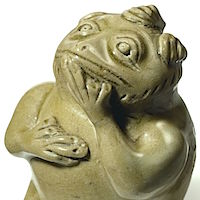
Jin Dynasty 晉朝 (265 – 420 CE)
Jin Dynasty 晉朝 Jìn Cháo
Weakened by decades of warfare, the last of the Three Kingdoms fell to the Jin who reunited China but soon fell into the pattern of crisis-civil war-invasion. This led to a further breaking apart of centralized territory, the "Sixteen Kingdoms" period, the War of the Eight Princes, and the Western Jin becoming the Eastern Jin (317–420), and the moving of the capital to Nanjing. Famous for its greenish celadon porcelain, this period at first repressed Taoism but then tried to exploit it while many secret Taoist schools prospered. Buddhism also flourished as Mahayana evolved, became popular, sutras were written, and over 1000 Buddhist temples were built. Taoism advanced chemistry and medicine, Mahayana philosophy and literature.
Sages (14)
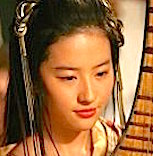
Arya Prajnadhara
5th century CE
27th Zen Patriarch, one of the few women Zen lineage leaders, and teacher of Bodhidharma; details about Arya Prajnadhara’s life are rare and difficult to find. Because of being a woman Patriarch in this predominantly male tradition and because of encouraging Arya Bodhidharma’s travels to China; although being almost completely unremembered by history, she had a huge influence on the evolution of Buddhism. Since her main disciple moved to China and Chán Buddhism mixed with Taoism, this influence in India diverted into the Maha Siddha tradition, spread to Tibet as Vajrayana, and reunited with Chán as Maha Ati or Dzogchen.
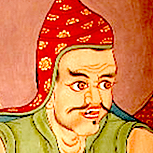
Āryadeva འཕགས་པ་ལྷ། (Kannadeva)
3rd C. CE
Born a king, Aryadeva became teacher to 1000 monks, a Mahasiddha, abbot of Nalanda University, disciple/teacher of Nagarjuna, 15th patriarch of Chan Buddhism, medicine doctor monk, and cofounder of the Mahayana school. One of “the six great commentators on the Buddha's teachings,” he wrote many important texts, exemplified in his path the progressive loss of a belief in a separate self, and remains a shining example of direct and complete realization.
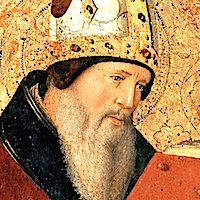
Augustine ɔːɡəstiːn (Saint Augustine, Saint Austin, Augustine of Hippo)
354 – 430 CE
Philosophical Christian theologian, Neoplatonist, prolific writer of over 100 books, and strong influence on the evolution of Western philosophy; Augustine fought against slavery and pre-emptive war, supported women’s rights, and encouraged the acceptance of Jews. Although responsible for defining and promoting the concept of original sin, railing against magic, and fighting against paganism; his vision of the “heavenly city” positively influenced Marxism, the Enlightenment, and the environmental movement. Although used as a foundation for dogmatic belief systems, he appreciated doubt and described the search for truth and understanding as a “restless journey.” Channeling the mysticism of Plotinus and influenced by Virgil, Cicero, Stoicism, and Platonism; he became a focus for later philosophers like Schopenhauer, Kierkegaard, Bertrand Russell, Nietzsche, and Heidegger.
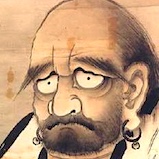
Bodhidharma 菩提達磨 (Daruma)
5th-6th C. CE
28th Zen Patriarch and first Chinese patriarch, the Indian prince Bodhidharma brought Chan Buddhism from India to China and began the Shaolin Kung Fu tradition founding the Shaolin Monastery. Known as "The Blue-Eyed Barbarian,” his direct authenticity confounded and impressed everyone from the emperor to famous teachers to peasants. He directly taught the wisdom beyond words, mind-to-mind and heart-to-heart transmission. In Japanese legend, he also traveled to Japan and met Prince Shotoku who then became the first great patron of Buddhism there.

Guan Yu 关羽 (Guan Gong, Guān Yǔ)
160 – 270 CE
Considered a Bodhisattva and protector of Dharma in the Chinese Buddhist tradition, the ”Saintly Emperor Guan" and “subduer of demons” in Taoism, Guan Yu is also revered today by families, businesses, Chinese secret societies and Triads, by the criminal underworld as well as policemen. One of the best known Chinese historical figures throughout East Asia, he represents the epitome of loyalty and righteousness. Revered for his bravery and virtue, he has also become a popular figure in historical fiction, Chinese opera, movies, manga and even video games.
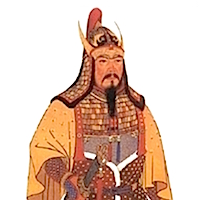
Gwanggaeto the Great 광개토태왕
374 – 413 CE
An early, conquering ruler, Gwanggaeto expanded Korea’s territory to it’s historically largest extent, established his country as one of the greatest in East Asia on equal standing with China, and began a golden age of Korean culture. His reign extended into Inner Mongolia, Western Manchuria, and the Russian seaside provinces. Considered the greatest Korean hero and today still seen as a nationalistic symbol, he established his own era name of “Eternal Rejoicing” and inaugurated a government for his son, Jangsu who ruled for 79 years, the longest reign in all of East Asian history. Debate between Korean and Japanese scholars over the meaning of a text inscribed on a 6.39 meter monument to Gwanggaeto remains in contention today.

Hua Mulan 花木蘭
386 – 534 CE
Considered by some historical, by others a legendary figure; either way, through much of modern Chinese history Mulan inspired women, poetry, essays, operas and paintings. To save her father, she pretended to be a man so she could take his mandatory place in the army fighting against the Mongols invading China. Since the earlier, matriarchal time of Fuxi and Nü Wa, this was one of the first examples of Chinese gender equality. During her 12 years in the army she turned down numerous distinctions, titles, and rewards for her successes and chose instead a return to a quite life at home.
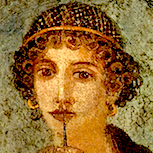
Hypatia
350 – 415 CE
Greek female philosopher, physicist, astronomer, mathematician, and head of a Neoplatonic tradition living and teaching in Egypt; Hypatia was known as a symbol of virtue even by many Christians who thought of her as far above the other philosophers of her own time. Considered the first famous "witch" tortured by Christians whose leader was later sainted, historians mark her murder by this mob as the end of Classical antiquity, the downfall of Hellenistic philosophy. Famous through history and referred to by historians, philosophers, feminists, scientists, and novelists; she is still popular today and associated with names like Marcel Proust, Carl Sagan, Umberto Eco, Dr. Who, and modern movies like Rachel Weisz’s 2009 Agora.
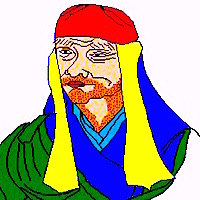
Kumārajīva कुमारजीव, 鸠摩罗什
344 – 413 CE
One of the world's greatest translators, the first to teach Nagarjuna’s Madhyamaka school in China, and symbol of early cultural cooperation; Kumārajīva supervised a team that translated the Diamond, the Lotus, the Prajñāpāramitā and more than 74 scriptures. This helped bridge the traditions of India, Central Asia, and China. With a non-sectarian and open mind, he focused on the sense rather than a literal translation and “revolutionized Chinese Buddhism.” His teaching became the Huayan or Flower Garland school, a foundation for the Chan (Zen) Buddhiist school as well as for the later revival of Taoism. The Emperor Yao Xing became his disciple and because of their work together, c. 90% of the Chinese population became Buddhists.
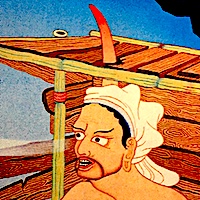
Nagabodhi ནཱ་ག་བོ་དྷི། (The Red-Horned Thief)
c. 180-265
Nagabodhi—a Brahmin turned thief—decided to rob the mahasiddha, Nagarjuna. Before he could do anything though, a golden chalice flew out a door and landed in his hands. He returned and something similar happened with a golden plate. At his third return, all of Nagarjuna’s wealth came to him as well as an invitation to eat and talk with the famous sage. Nagarjuna taught Nagabodhi meditation and gave him a houseful of precious treasures. Nagabodhi’s attachment and fixation on these however manifested as a large and painful horn growing out of the top of his head. Further instruction and practice enabled him to finally see through his delusion to the extent that he became Nagarguna’s successor. Mahasiddha #76
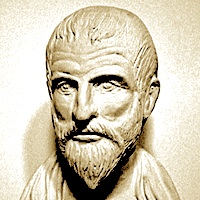
Proclus Lycaeus Πρόκλος ὁ Διάδοχος
412 – 485 CE
"The most influential Ancient Greek philosopher you've never heard of"
Proclus synthesized Greek philosophy into one system, developed Neoplatonism to its height, and became an important influence on Western medieval philosophy as well as philosophy as a whole. He believed that Plato was divinely inspired and wrote extensive commentaries. He described philosophy as a primary method for raising consciousness above materialism and as a step toward “unification with the One.” With insight into the process of discovering the meaning beneath the sense, he advocated using words to see through the limitation of words and to discover the deeper reality. An inspiration for Ralph Waldo Emerson and the New England Transcendentalists, he taught the Platonic emphasis on “the One,” “Intellect,” and the “Soul.”

Tao Yuanming
365 – 427 CE
Greatest Chinese poet during the Six Dynasties period (220 - 589 CE), one of the biggest poetic influences on Zen and Beat poetry, and in a small group of history’s best poets; stories say Tao Yuanming drained rivers of wine with friends in glades on moonlit nights celebrating the miracle and wonder of moment-to-moment perception. Military/government career drop out, back-to-the-land champion, discoverer of Peach Blossom Spring; he didn’t follow in the steps of any religion, didn’t do any of the recommended practices; he reveled in the fulness of here-and-now working in his garden, reading books, playing the zither, chopping wood and carrying water.
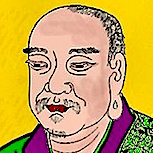
Vasubandhu 世親
4th to 5th C. CE
21st Zen Patriarch, poet, one of the most influential Indian Buddhist philosophers, and co-founder of the Yogacara school; Vasubandhu’s writings on Abhidharma are still widely studied as a major foundation of Mahayana teachings. The Second Patriarch of the most popular branch of Buddhism in Japan, the Jōdo Shinshū school that claims 20% of Japan’s population today; he pioneered the “Mind Only” tradition, the beginnings of Dzogchen, formal logic, and the non-dual nature of reality. These teachings seeped into Western philosophy through people like Immanuel Kant and George Berkeley.
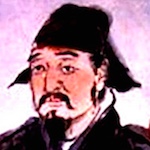
Wang Bi 王弼
226 – 534 CE
Although he only lived 23 years, for more than 1,700 years most Chinese scholars have considered Wang Bi the most important interpreter of the Tao Te Ching and his edition of this has been used for almost every translation into a Western language. A political theorist who challenged the prevailing Confucian orthodoxy, he interpreted Lao Tzu in a way consistent with Confucius and compatible with both indigenous Chinese beliefs and the introduction of Indian Buddhism. Interesting and inspiring how one so young can understand so deeply and influence the course of history so much.
Chinese Eras
Xia Dynasty 夏 (2100 – 1600 BCE)
Shang Dynasty 殷代 (1600 – 1046 BCE)
Western Zhou 西周 (1046 – 771 BCE)
Eastern Zhou 東周 (770 – 256 BCE)
Spring and Autumn period 春秋时代 (770 – 476 BCE)
Warring States period 春秋时代 (476 – 221 BCE)
Qin Dynasty 秦朝 (221 – 206 BCE)
Three Kingdoms 三國時代 (220 – 280 CE)
Southern and Northern 南北朝 (420 – 589 CE)
Tang Dynasty 唐朝 (618 – 907 CE)
5 Dynasties 10 Kingdoms (907 – 960 CE)
5 Kingdom of Dali 大理国 (937 – 1253 CE)
Western Xia 西夏 (1038 – 1227 CE)
Southern Song (1127 – 1279 CE)
Comments (0)